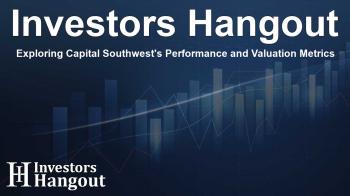Exploring Capital Southwest's Performance and Valuation Metrics

Understanding Capital Southwest's Market Position
In today's dynamic market, Capital Southwest Inc. (NASDAQ: CSWC) is currently trading at a price of $21.94, showing a slight increase of 0.55%. While this uptick is positive, a broader perspective reveals a decline of 3.86% over the past month and a more significant drop of 12.15% year-over-year. For shareholders, evaluating whether this stock is undervalued compared to its underlying performance is essential.
Capital Southwest's P/E Ratio Explained
The Price-to-Earnings (P/E) ratio serves as a key indicator for investors, reflecting how the market values a company's earnings. Long-term shareholders often rely on this metric to gauge performance against industry benchmarks and historical data. A lower P/E ratio might lead potential investors to believe that the stock is either undervalued or that the company lacks expected growth potential.
Comparison with Industry Standards
Capital Southwest's P/E ratio currently stands below the industry average of 17.14 within the Capital Markets sector. Although one might infer from this lower figure that the stock may underperform compared to its competitors, it also raises the possibility of being undervalued. Investors must weigh these indicators carefully.
The Significance of P/E Ratios in Investment Strategies
Analyzing the price-to-earnings ratio provides valuable insights into a company's market performance. However, it is important to remember that this metric does have its limitations. A low P/E may imply undervaluation, but it can also hint at muted growth expectations from shareholders. Thus, this metric shouldn't be viewed in a vacuum.
Broader Market Influences on Valuation
Investors should consider additional factors alongside the P/E ratio. Influences such as shifting industry trends, economic conditions, and broader business cycles all contribute to a company's stock price and overall market performance. Therefore, employing the P/E ratio together with various financial metrics and qualitative analyses forms a more holistic approach to investment decision-making.
Frequently Asked Questions
What is Capital Southwest's current stock price?
Capital Southwest Inc. is currently trading at $21.94.
How does the P/E ratio help investors?
The P/E ratio helps investors assess the company's market performance and valuation in relation to earnings.
What does a lower P/E ratio suggest?
A lower P/E can indicate that a company might be undervalued or that shareholders do not expect significant future growth.
How does Capital Southwest compare to its industry?
Capital Southwest has a lower P/E ratio than the industry average of 17.14, suggesting potential undervaluation.
Should the P/E ratio be used alone for investment decisions?
No, investors should use the P/E ratio alongside other financial metrics and qualitative analysis for well-rounded decision-making.
About Investors Hangout
Investors Hangout is a leading online stock forum for financial discussion and learning, offering a wide range of free tools and resources. It draws in traders of all levels, who exchange market knowledge, investigate trading tactics, and keep an eye on industry developments in real time. Featuring financial articles, stock message boards, quotes, charts, company profiles, and live news updates. Through cooperative learning and a wealth of informational resources, it helps users from novices creating their first portfolios to experts honing their techniques. Join Investors Hangout today: https://investorshangout.com/
Disclaimer: The content of this article is solely for general informational purposes only; it does not represent legal, financial, or investment advice. Investors Hangout does not offer financial advice; the author is not a licensed financial advisor. Consult a qualified advisor before making any financial or investment decisions based on this article. The author's interpretation of publicly available data shapes the opinions presented here; as a result, they should not be taken as advice to purchase, sell, or hold any securities mentioned or any other investments. The author does not guarantee the accuracy, completeness, or timeliness of any material, providing it "as is." Information and market conditions may change; past performance is not indicative of future outcomes. If any of the material offered here is inaccurate, please contact us for corrections.
